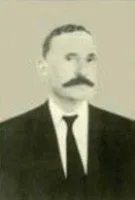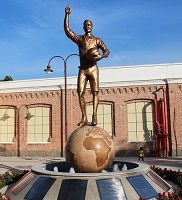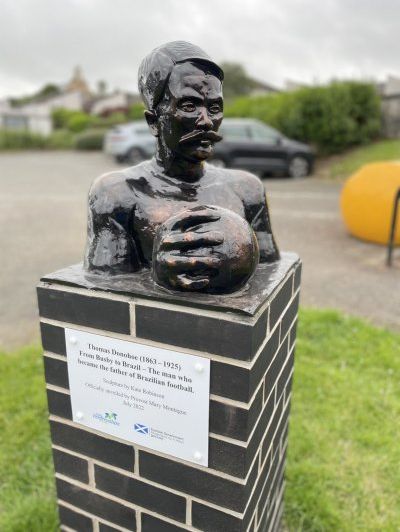Tommy Donohoe

It is said that Thomas, "Tommy", Donohoe as a younger man had played up front, as it was alongside Scotland internationals, Mick Dunbar and Bobby Calderwood, for Cartvale, effectively his, their village team. But life continued and in his late twenties he had decisions to make about where it would take him and his new wife, Liza. And fate's decision was Brazil, to Bangu then just outside Rio de Janeiro now a suburb to teach the local workforce of a newly-built textile mill the latest techniques he had learned from dye-work in that same village, Busby.
But in Brazil, from where he would finally never return, Tommy's passion for football remained undiminished. To satisfy it he is said to have travelled into Rio itself but found none of the required equipment; not even boots or a ball. So he sent home for it and when his wife came out to visit him for the first time in 1894, eventually to remain in Brazil and die there too, it was in her luggage.
Thus it was Elizabeth, Eliza or Liza, Donohoe, who actually carried the first proper football to South America's largest country and modern, football super-power. But what followed on from Tommy was then the implantation of the game; laying out of the first rough football pitch, the construction of ad hoc goals and the playing of basically six-a-side games between his British colleagues at the mill. They were the first football game played certainly in Brazil's then capital, Rio, and now known to be earlier, although not by much, even than Charles Miller's one in Sao Paulo that same year; he English-educated but with a Largs-born so Scots father.
So who was Thomas "Tommy" Donohoe? He was the second son of two Irish immigrants, Patrick Donohoe, born in County Wicklow, a block printer and a foreman also at the dyeworks, and his wife, Mary Ann Sloan. He was born in Busby in 1863, would live there all his childhood, his adolescence and his early manhood and when in the Catholic Church in nearby Sheddens, Cathcart in 1890 he married Elizabeth (Eliza) Montague from The Gorbals, who working in the same printfield, i.e. dye-works, as her husband, they they made their first home there. Indeed their two sons, John and Patrick, who would go to Brazil to Bangu with them, were both born in the village in 1891 and 1894 respectively. In Brazil Patrick would even become from 1913 to 1922 a star player for Bangu Atletico F.C., the team, which eventually in 1904, after a delay caused not by lack of desire in the interim but internal company politics, Tommy's presence would be instrumental in founding, elected Vice-President, and play in four early fixtures even at the age of forty-one. That foundation together with his introduction of football to Rio is celebrated with an enormous, gold statue in front of the textile-mill, which he helped to start, remained his work-place until his retirement and is now Bangu's main shopping centre.


And the Bangu statue erected in 2014 has now been partially replicated in Busby itself by the in 2021 oy the placing on Main St. of a bust of Tommy with a brief explanation of his footballing importance some six thousand miles from home. But Bangu Atletico's and therefore Scots, or more accurately Scots-Irish Donohoe's importance to Brazilian football is not just its introduction. From its creation the Bangu club was open to all employees of the textile mill. It was thus an inclusive working-class team, one competing against mainly exclusive ones. Moreover its players were draw from several countries and were of even more creeds and colours. That meant it was rapidly to include the first Black Brazilians to play the game, certainly in Rio de Janeiro.
However, it also meant that on several occasions Bangu Atletico came into conflict with clubs elsewhere in the city, clubs which had colour bars. Indeed on a number of occasions it was expelled from the local top-flight league for insistence on inclusivity, thus becoming the pioneer of the multi-racial game that football became in Brazil and would eventually become in all of South America.
Birth Locator:
Residence Locator(s):
1871 - Spinners Land (Now Riverside Terr.), Busby, Renfrewshire
1881 - Burton's Land, Busby, Renfrewshire
1891 - Burnside ( Now Riverside) Terr., Busby, Renfrewshire
1894 - Bangu, Rio de Janeiro, Brazil
1918 - rua Fonseca 7, Bangu, Rio de Janeiro, Brazil (On Donohoe's Brazilian remarriage)
Death Locator:
1925 - Bangu, Rio de Janeiro, Brazil
Grave Locator:
N/A
Ground Locator:
and
Other Sources:
Back to the Upper White Cart Trail
or the SFHG Home page